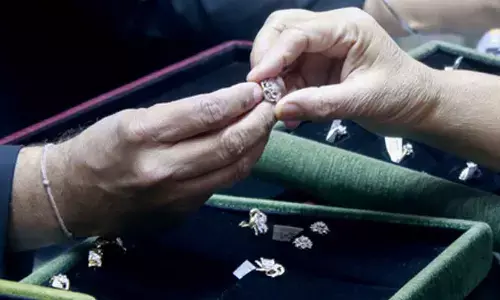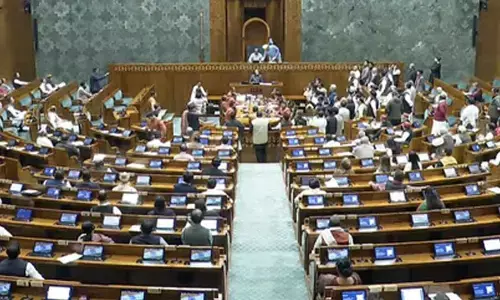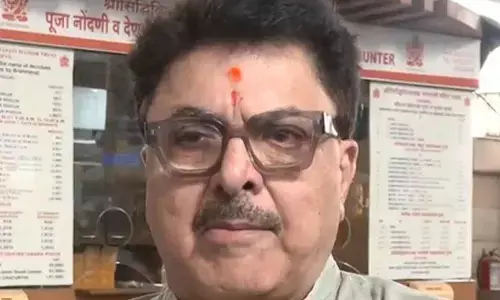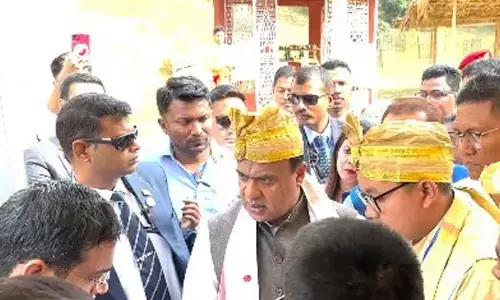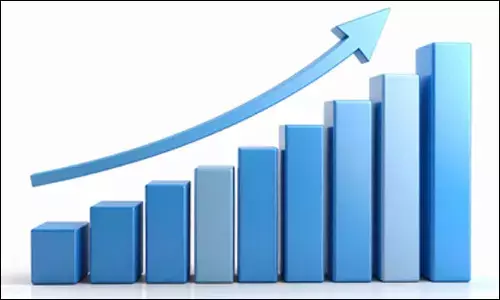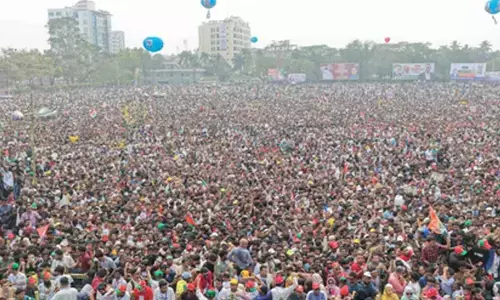G20 leaders wary of trade war
 PM Modi, Donald Trump, Mohammed bin Salman, Shinzo Abe and other G20 leaders depart after a family photo session in Osaka on Friday
PM Modi, Donald Trump, Mohammed bin Salman, Shinzo Abe and other G20 leaders depart after a family photo session in Osaka on FridayLeaders from the Group of 20 major economies on Friday expressed concern over an escalating trade war between the US and China, calling it a serious downside risk to the global economy, along with geopolitical tensions in the Middle East.
Osaka: Leaders from the Group of 20 major economies on Friday expressed concern over an escalating trade war between the US and China, calling it a serious downside risk to the global economy, along with geopolitical tensions in the Middle East.
On the first day of their two-day summit in Osaka, the world leaders assessed the status of the global economy while scepticism persists over whether they can jointly uphold the rules-based, multilateral trading system.
Japanese Prime Minister Shinzo Abe, hosting the summit, faces the task of projecting a united G-20 front despite disagreements over contentious issues such as trade and climate change. Abe said during a working lunch that a free and open economy was the foundation for peace and prosperity.
He added that the moment was right for issuing a strong message in favour of maintaining and strengthening a free, just and non-discriminatory trade system. The trade war between Washington and Beijing started in 2018 and has affected the global economy as well as having periodic repercussions on stock markets.
"Concerns were expressed by many countries about heightened trade tensions," a senior Japanese government official said, adding that the G-20 shared the need to promote global growth at a time of downside risks.
The G-20 dropped its signature pledge to fight protectionism in the 2018 meeting in Argentina as US President Donald Trump pushed his "America First" agenda and shied away from multilateral arrangements. "We should send out a strong message," Abe said as he opened this year's G-20 leaders' discussions.
The Japanese Premier said he was "deeply concerned" about the current global trade situation, saying restrictive measures will not benefit any country, in an apparent reference to tit-for-tat tariff hikes by the US and China.
At the summit that will also address environmental issues, the G-20 leaders are expected to agree to end the discharge of plastic waste in the world's oceans by 2050, Kyodo reported, citing sources familiar with the matter.
UN Secretary General Antonio Guterres, speaking in the western Japan city, said that it will be "very difficult to have a breakthrough in relation to some of the most difficult challenges that the international community is facing".
Other heads of international organizations such as the International Monetary Fund and the World Trade Organization, as well as nearly 10 invited countries including Singapore and Thailand, are also participating in the summit.
Bilateral talks scheduled for Saturday between Trump and Chinese President Xi Jinping have already gripped the G-20 as the tariff battle between the world's two largest economies threatened to darken the economic outlook given the integrated nature of global supply chains.
Rising tensions in the Middle East amid a US-Iran standoff over the landmark 2015 nuclear deal have also become a concern for the world economy and sent oil prices higher.
In Friday's session, the G-20 leaders agreed on the "urgency and importance" of reforming the World Trade Organization (WTO), seen as a symbol of multilateral free trade. Under the WTO, launched in 1995, countries negotiate trade rules. It also provides a dispute settlement mechanism.
The US has taken aim at the WTO's failure to enforce its rules on China, blocking appointments to its appellate body. "We are working closely with the US and Japan as well as China and others on reforming the WTO and creating a level playing field," European Commission President Jean-Claude Juncker said.









